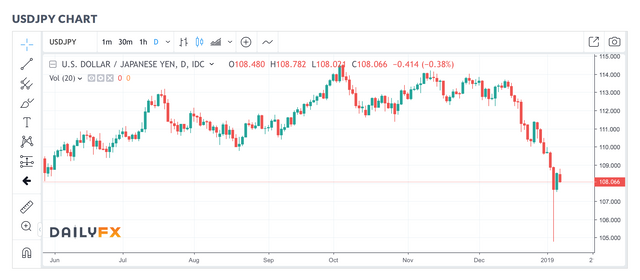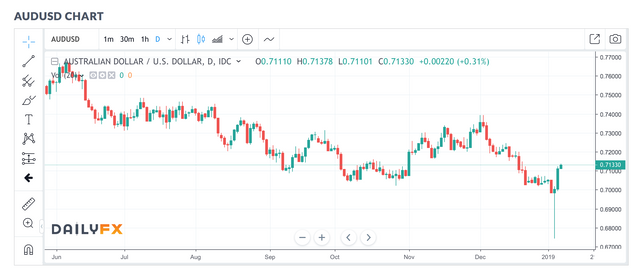When most foreign exchange investors are still immersed in the joy of the new year, the international foreign exchange market is quietly welcoming the first flash sink in 2019 - the Asian trading session on January 3, in just 7 minutes, the yen against The Australian dollar rose 8%, and the US dollar soared nearly 4% to the biggest increase in nearly a decade. The rise of the unpopular Turkish lira is more than two digits. There have also been significant ups and downs in many other crosses. Surprisingly, this flash crash occurred during off-peak trading hours. What is the reason behind this flash sink?


(Source: https://www.dailyfx.com)
Apple's downward revision of its Q1 earnings forecast is only a trigger for the market.
The day before yesterday, Apple lowered its Q1 performance forecast and revealed information on the decline in demand in China region. Although this may not be a rational judgment (Huawei and other domestic competitors have eroded some of Apple's market), but with the background of the global economic weakness this year, it has amplified the risk aversion of the foreign exchange market, leading to a sudden collapse in off-peak trading hours.
Procedural transaction
This flash crash occurred in the light of the trading hours of the New York session and before the opening of the Tokyo session, most of the transactions were made by the algorithm's "chasing up and down" logic. In the foreign exchange market, once the critical stop loss level is touched, the algorithmic trade will be sold wildly, making the trend worse and eventually leading to a collapse.
Market evacuation
The JPY’s short-selling power has sharply increased, making Thursday’s market evacuation e even more intense. According to the latest data released by the CFTC, the JPY/USD still achieved a speculative net position, and the net position increased by 5,165 contracts. However, due to the US government's suspension, the CFTC failed to announce the new position data on December 28.
Since the beginning of 2019, the foreign exchange market ushered in an avalanche-like crash. It seems that this year's market is not very optimistic. In fact, many people have already felt that this year is not good. However, in the foreign exchange market, there is always a more advanced gameplay to help investors better avoid market risks and maximize profits.
ET Manager, next generation of AI trading system by DDT
Ez-Trade referred to as ET was founded in 2017 by Director of Risk Control of DDT, THOMASRONY, in conjunction with Ukrainian top foreign exchange futures financial expert ANDY HILL. The team successfully developed an AI trading system with self-correcting big data technology combined with the past and real-time international market transaction data to automatically adjust the best trading strategy.
ET cloud computing, an omnipotent super brain
The calculation of the foreign exchange market is the analysis of the intersection of countless data. ET Manager uses cloud computers to mine big data for upcoming trading models to find the most fault-tolerant trading parameters. Massive data, it is difficult to make a correct judgment based on the trader's personal experience, and all of this will be realized by the ET Manager for the customer. Customers can improve their profitability in areas such as international futures, foreign exchange, gold, silver and oil trading market turnover rates, and reduce the instability of artificial risk control to achieve risk avoidance.
First in Europe and America, 13.38% monthly average profit
DDT has nearly 50,000 clients in Europe and the United States, it also has nearly $1 billion funds under the management of ET-Manager to conduct trades on the International Foreign Exchange Trading Platform (MT4). The average monthly profit is now 13.88%
DDT has been highly praised and recognized by the industry and eventually received the award of " 2018 Best Forex Dealer in Eastern Europe" and " 2017 Europe's Best Artificial Intelligence Innovation Award".
With the success and recognition of ET-Manager in 2017-2018 in Europe and the United States, DDT go beyond Europe and the United States, and venture into the Asian financial markets, specifically Singapore and China, so that more Asian users can enjoy the considerable profits and high security dividends brought by financial technology.
Downvoting a post can decrease pending rewards and make it less visible. Common reasons:
Submit